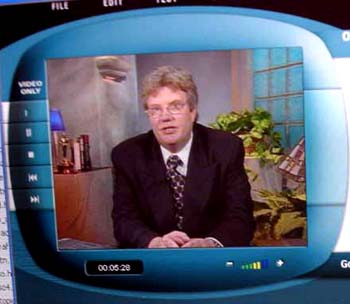| |
 |
|
Are Podcasting and RSS considered Broadcasting?
Insights by Donald Burleson |
The term "Broadcasting" originated in early 20th
Century America in an effort to give a meaningful name to the
process of radio transmission. In the early days of the 1900's most
Americans were farmers and very familiar with "broadcasting", the
processing of spreading seeds by slinging them in a concentric
circle.
In the legal arena, judges have struggled to
see if existing laws apply to the internet, and one of the major
reasons cited for the difference between traditional broadcasting
and the web was the "passive" nature of web pages, where you must
actively find them via hyperlink or a search engine.
With RSS, you can subscribe to an RSS feed,
just like subscribing to a TIVO channel, and the content is
broadcast directly to you newsreader.
The future of the on-demand
web
It's very clear that bloggers and traditional
broadcasters may soon move onto the internet and a few key future
developments will foster this issue:
 |
Once traditional radio and television
switches to the internet-based format (much the same as "Vonage"
and the voice-over-IP telephone technologies), we are going
to see a movement to legislate on-demand web broadcasting
under the auspices of the FCC.
I've perfected a video-based blog that
allows people anywhere to view me in a professional video
format using RSS newsreaders:
|
I'm currently working on new technology
incorporating automatic speech recognition to provide a text-based
supplement for the hearing impaired:

I'm planning to make my blogs and technical
presentations as classy as CNN, and once they start getting
broadcast over the internet, I may find myself subject to the nasty
regulations governing other broadcasters.
Are RSS feed authors to be
considered a publisher or a distributor?
The American judicial system is struggling with
this central issue of whether on-demand broadcasting of web content
constitutes broadcasting, and most important, if this broadcasting
falls within the purview of the Federal Communications Commission
(FCC), sometimes known as "Uncle Charley" by those in the
broadcasting industry.
This is a very important question, especially
in cases of civil law such as
cyberlibel. Here is a case where the FCC is attempting to
interfere with the new
Broadcast Flag technology.
Are bloggers broadcasters?
Because blogs may be considered a form of
broadcast media, all blog operators have to be careful not to
violate the strict FCC guidelines for obscenity.
This link has great examples of
obscenity rules for broadcasters:
Material is offensive if it offends the
"average" broadcast viewer or listener. Commission staff, and
ultimately the Commissioners themselves, decide what the average
person finds offensive. Examples of the Commission's findings
include:
-
popular songs which contain repeated
references to sex or sexual organs (e.g., "I Want To Be A
Homosexual," "Penis Envy," "Walk With An Erection," "Erotic
City," "Jet Boy Jet Girl," "Makin' Bacon");
-
DJ banter concerning tabloid sex
scandals (e.g., Vanessa Williams' photographs in Penthouse and a
honeymooner whose testicle was caught in a hot tub drain);
-
discussions between DJs and callers
concerning intimate sexual questions (e.g., "What makes your
hiney parts tingle?"; "What's the grossest thing you ever put in
your mouth?");
-
dirty jokes or puns ("Liberace was great
on the piano but sucked on the organ");
-
non-clinical references to gay or
lesbian sex, masturbation, penis or breast size, sodomy,
erections, orgasms, etc; description or simulation of various
sexual acts;
-
and the seven dirty words (sh*t, f**k, p*ss,
c*nt, c**ksucker, motherf**ker, t*ts).
In sum, the passive nature of the web is
changing, and the advent of subscription-based web broadcasting may
open Pandora's box, with U.S. government regulators and bureaucrats
coming after millions of tiny web-based broadcasters.
|
